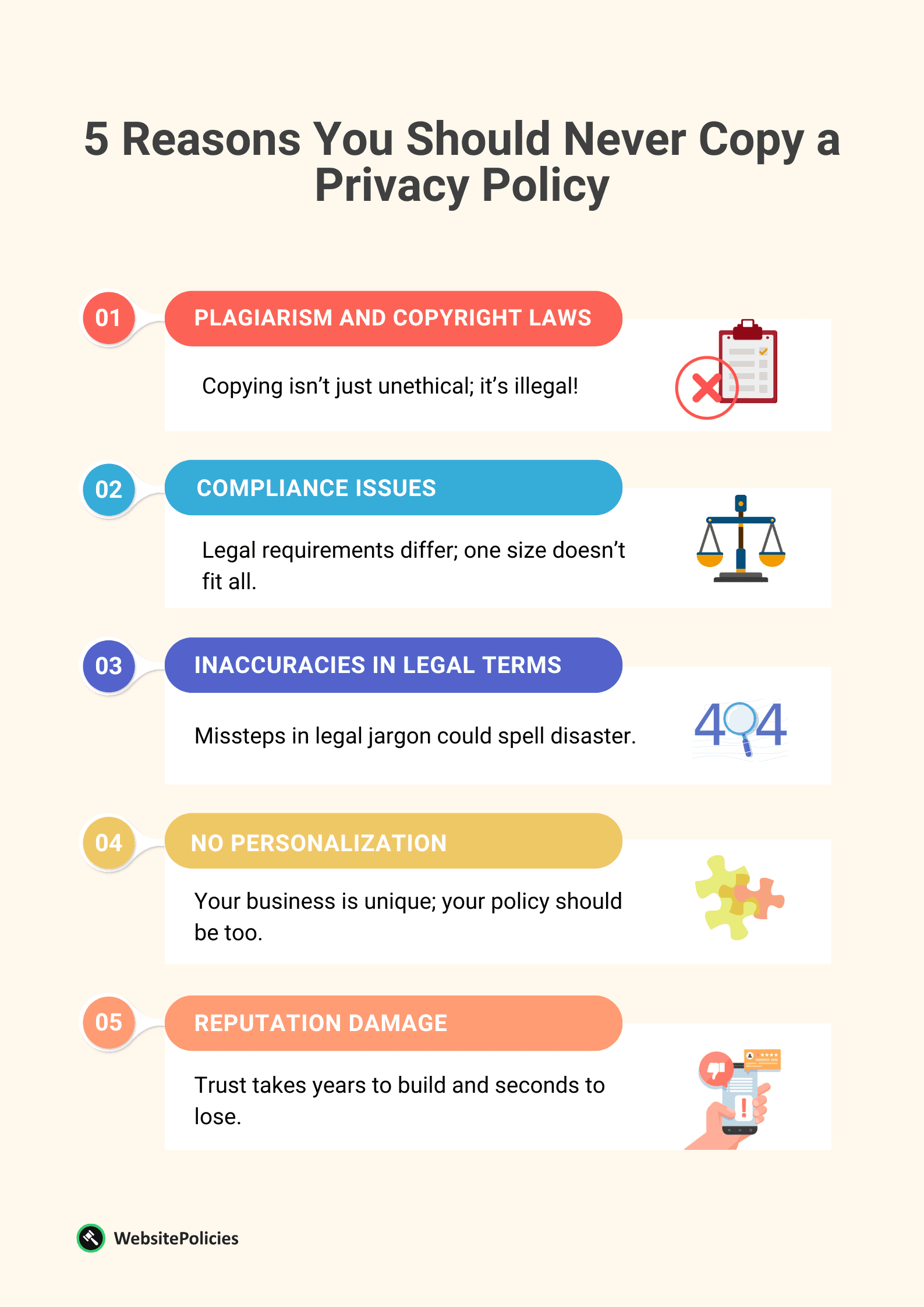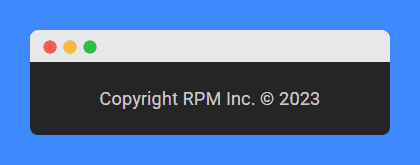Do you need a privacy policy for your website? Are you considering copying one to save time and effort? Many business owners find themselves in this position, and it’s easy to see why.
Writing a privacy policy can be a complex and time-consuming task. And the internet – a vast sea of information where everything seems up for grabs, right?
But taking a shortcut to copy a privacy policy page from someone else is a terrible idea, considering there are easy alternatives that will keep you out of a lawsuit.
Let’s get into it.
- Copying a privacy policy from another site is illegal, can lead to lawsuits, and may not accurately reflect your site’s operations or culture.
- Risks of copying a privacy policy include copyright infringement, non-compliance with relevant laws, inaccuracies in legal terms, inadequacy for your business needs, and reputational damage.
- To protect your privacy policy from being copied, include copyright notices, personalize it to your business’s specific practices, and update it regularly.
Table of Contents
PRO TIP: Take the hassle of writing your own privacy policy away with our privacy policy generator trusted by over 200,000 businesses. It’ll save you hours of work and possible costly legal mistakes.
Can You Copy a Privacy Policy?
No, you should not copy a privacy policy from someone else because you might end up with a policy that doesn’t cover all the data you collect, doesn’t explain how you actually use and store that data, or promises things you don’t do.
Privacy laws are not one-size-fits-all – they vary depending on factors like where your business is located, where your customers are, what kind of data you collect, and so on.
So, a privacy policy that works for one business might not work for another. It can lead to inaccurate or misleading information. It’s like trying to use a roadmap of New York to navigate London – you’re likely to get lost.
Lastly, let’s not forget about copyright. A well-written privacy policy can be protected by copyright laws, particularly if it includes creative and unique elements.
If you copy someone else’s privacy policy, you could be infringing on their copyright. And that can lead to a world of legal trouble that’s best avoided.
5 Reasons Why You Must Not Copy a Privacy Policy
Here are some reasons why copying a privacy policy or any other legal document from someone else is a terrible idea:

1. Plagiarism and Copyright Laws
Let’s start with this – it’s important to think about privacy policies as you would any other intellectual property. They’re not just boilerplate text – they are protected under copyright laws. Simply put, just because it’s on the Internet doesn’t make it free for all.
Remember how you felt when you first set up your business? The pride in creating something uniquely yours? That’s exactly how the original authors feel about their content.
When you copy and paste a privacy policy from another website or application, you are plagiarizing – and that’s not only unethical but also illegal.
This could result in legal actions against your business, which could cost you financially and also tarnish your business reputation.
2. Compliance Issues
Different businesses operate under different legal jurisdictions and have diverse data-handling processes.
Copying someone else’s policy could lead to a mismatch in these terms, which might not accurately represent your business, and might mean you are not in compliance with your specific legal requirements.
For instance, if you’re a Europe-based business subject to GDPR, copying a privacy policy from a US site could get you in deep water. Compliance isn’t just a fancy buzzword, it’s an absolute necessity to avoid serious legal implications.
If you end up in a legal scenario where you’re held accountable for terms that don’t even apply to your business. It’s like being in a French cooking class when you’ve only learned Italian recipes. You’re lost, and the consequences could be messy.
3. Inaccuracies in Legal Terms
Privacy policies are a delicate balance of legal jargon. You might think that all privacy policies are the same, but that’s like saying all cars are the same because they have four wheels. It’s the specifics that count.
If you aren’t well-versed in legal jargon, you might not even realize that the copied privacy policy may contain terms and clauses that can be irrelevant or even harmful to your business.
These documents are a minefield of legal jargon, with each term holding significant weight. Misinterpreting or misrepresenting these terms could result in a disaster, like having to defend your business in court or paying hefty fines.
4. No Personalization
Your business is unique, right? You’ve built it that way. Just like your brand, your privacy policy should reflect your business’ distinct data practices.
Copying a privacy policy doesn’t take into account the specifics of your business and how it handles user data. You could miss key aspects of your data practices, like how you use cookies, or how you handle third-party data.
This could create legal risks that could have been avoided with a personalized policy.
It’s like buying a pair of shoes that are two sizes too big because they’re fashionable. Sure, they might look good, but they’ll cause you a lot of pain and problems down the line.
When you create a privacy policy, it needs to be tailored to your business to ensure all bases are covered, and all of your data practices are accurately represented.
5. Reputation Damage
Do you know what’s precious in today’s digital world? Trust. When customers use your website, they trust you with their data. Having a privacy policy that isn’t custom-tailored to your business might mean that your data practices aren’t accurately reflected.
Imagine the fall-out if a breach occurs and customers discover your policy wasn’t as described?
Trust can take years to build and just seconds to lose. So, don’t risk it over something you have control over, like a solid, accurate privacy policy.
Are Privacy Policies Copyrighted?
Yes, privacy policies can be protected by copyright but there are some things you need to be aware of as the copyright laws don’t extend to standard procedures or facts.
The bare facts presented in a privacy policy, such as the types of information a business collects, aren’t protected by copyright law. Similarly, standard clauses and language typically used in such policies might not be unique enough to warrant copyright protection.
However, the way these facts and clauses are expressed, the structure, and any unique or creative language used, could be protected by copyright law.
So, while it’s technically correct to say that a privacy policy as a whole can’t be copyrighted, significant portions of it might be protected if they demonstrate sufficient originality and creativity.
That’s why it’s not a good idea to copy and paste a privacy policy from another business verbatim. Even if some parts might not be copyrightable, other parts could be.
Plus, using someone else’s privacy policy can still lead to other issues, like inaccuracies and non-compliance with laws, that we’ve discussed earlier.
Your best bet? Tailor a privacy policy that accurately reflects your own business’s practices. It’ll keep you on the safe side legally and ensure you’re providing accurate information to your users.
How Can I Protect My Privacy Policy From Being Copied?
As they say, an ounce of prevention is worth a pound of enforcement. In this case, this phrase means that it is often more beneficial to take steps to prevent your privacy policies from being copied in the first place than to try to file a lawsuit after the fact.
Include Copyright Notices
Think of a copyright notice like a “No Trespassing” sign for your privacy policy. You’re letting folks know, right off the bat, that you’re the author of this work and that they shouldn’t go copying it without permission.
It’s like tagging a piece of artwork in a gallery – it attributes the work to the artist and sends a clear message: this is my creation, respect it.

Placing a copyright notice on your privacy policy isn’t just about discouraging copycats, though. It also serves a useful function if someone does decide to copy your work and you end up in court.
In a copyright infringement case, the person who copied your work might try to claim that they didn’t know the work was copyrighted. But if you’ve put a copyright notice on your privacy policy, that defense goes out the window.
In short, using a copyright notice is a simple and effective way of telling the world that your privacy policy is your property and shouldn’t be copied.
Personalize to Your Needs
The key to making a privacy policy hard to copy is personalization. Imagine that you’re trying to copy a painting, but the artist keeps adding new details.
Every time you think you’ve got it down, there’s something new to catch up on. That’s the effect personalization has on a privacy policy.
PRO TIP: When you write a privacy policy that’s unique to your business, you’re infusing it with your specific practices and procedures. Anyone attempting to copy it will find it hard to replicate the details.
You might include specific language about your products or services, tailor your data handling practices to reflect your unique operations, or include special provisions that are unique to your business model.
Each of these elements is like adding another brushstroke to your painting, making it harder for anyone to create an exact replica.
If you choose to use a privacy policy template, take your time to modify it to your needs.
They can be great as a starting point but many people mistakenly simply copy them without changing anything at all. Don’t make this mistake and personalize it instead accordingly.
Update Regularly
By frequently updating your privacy policy to reflect changes in your data practices or in response to new laws and regulations, you’re essentially moving the goalpost for anyone trying to copy it.
A good privacy policy is a living, breathing document. The more it reflects your business and the more regularly it’s updated, the harder it will be for anyone else to copy.
It’s not just about legalities – it’s about crafting something that’s so unique, so tailor-made to your business, that copying it just doesn’t make sense. Because let’s face it, nothing beats an original.
Frequently Asked Questions
Can I copy a privacy policy from another website?
No, copying a privacy policy from another website is illegal and can lead to legal consequences such as a lawsuit. Each privacy policy is unique and tailored to a specific website’s needs.
What are the risks of copying a privacy policy from another website?
Risks include breach of plagiarism and copyright laws, compliance issues, inaccuracies in legal terms, policy inadequacy, and reputation damage. Each of these can result in lawsuits, fines, and reputational damage.
Are privacy policies protected by copyright?
Yes, privacy policies can be protected by copyright laws. Note that while some parts may not be copyrightable, significant portions demonstrating originality can be.
How can I protect my privacy policy from being copied?
Include copyright notices, personalize the policy to your business, and update it regularly to make copying more difficult.
Why is personalization important for a privacy policy?
Personalizing the policy ensures it accurately reflects your business’s data practices, making it harder for others to replicate and preventing legal risks.



